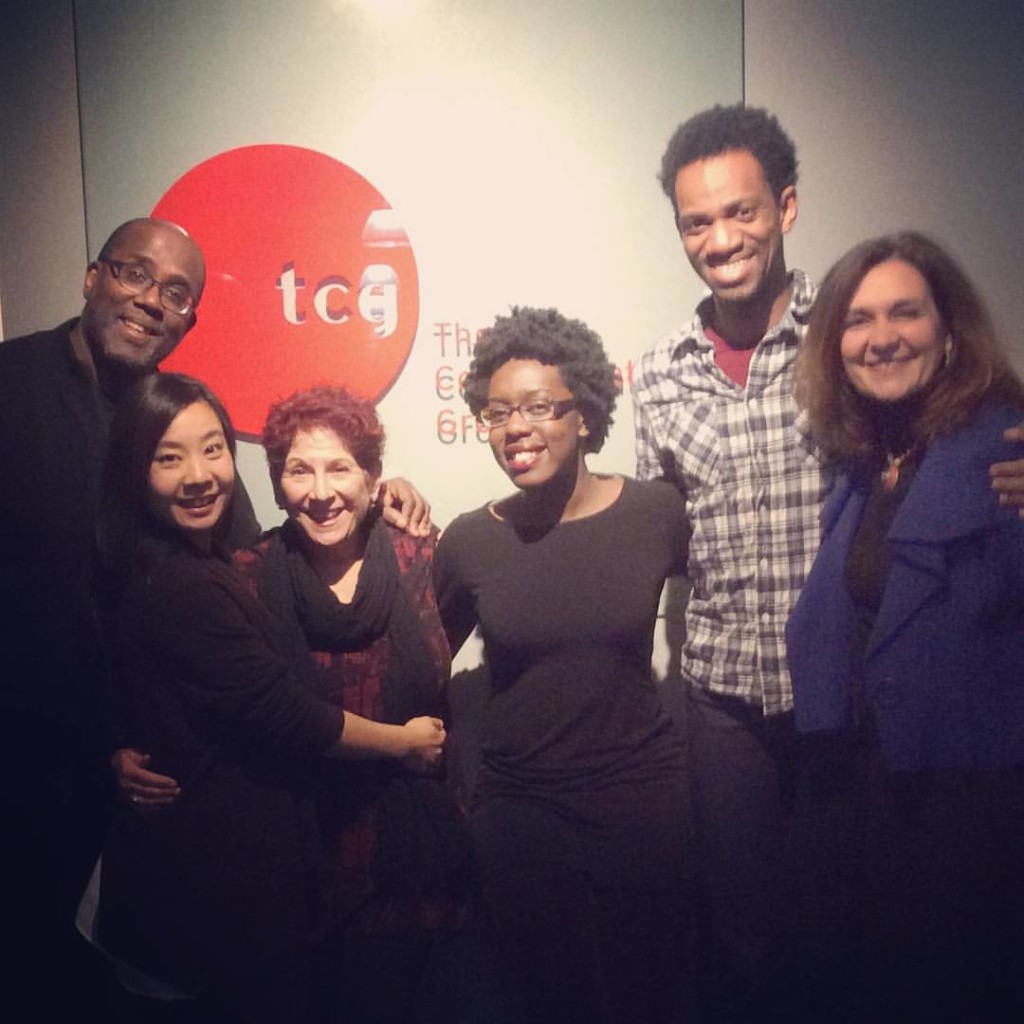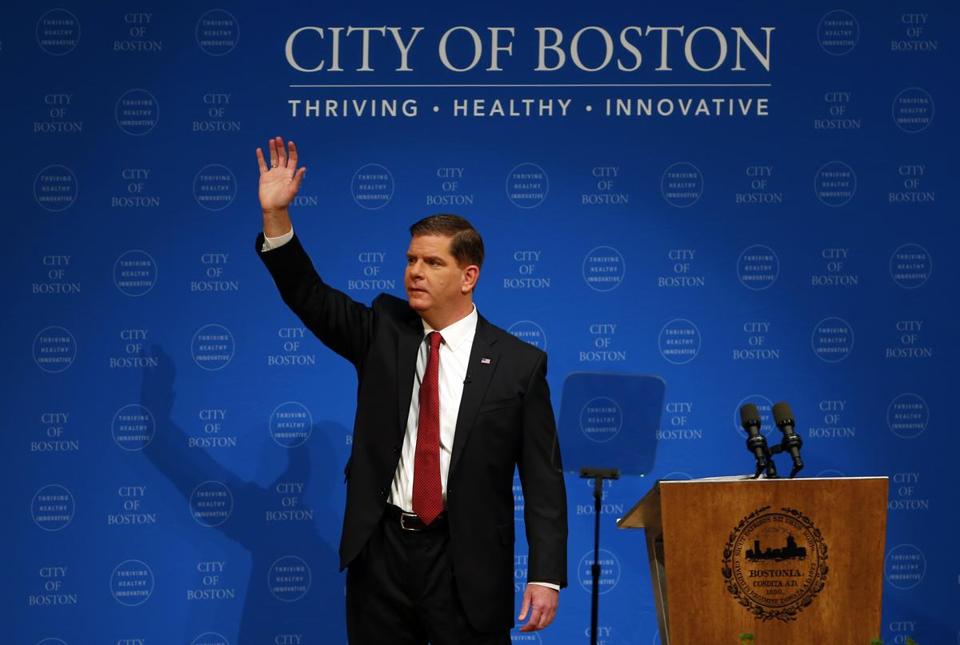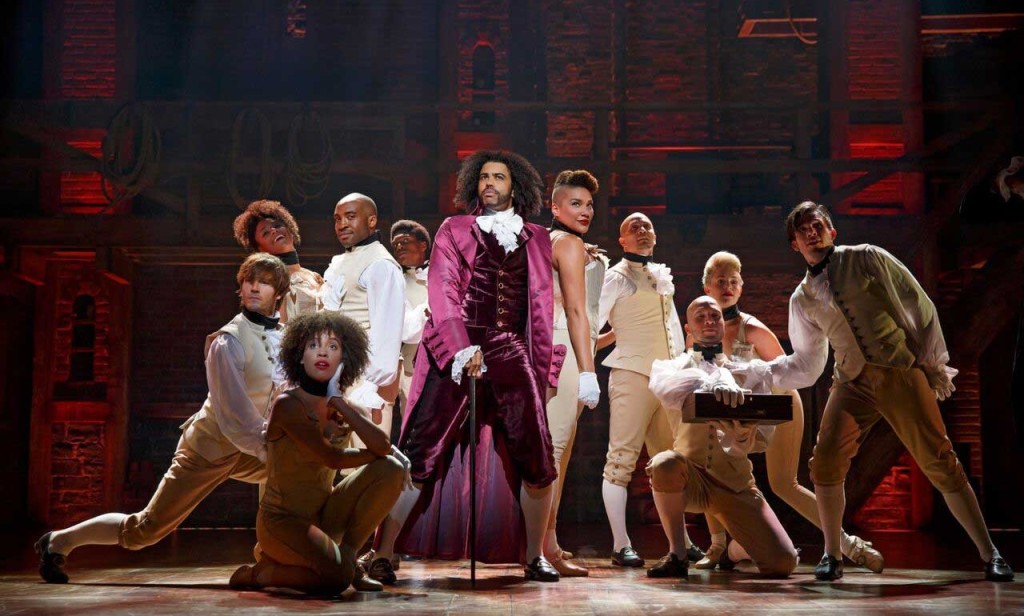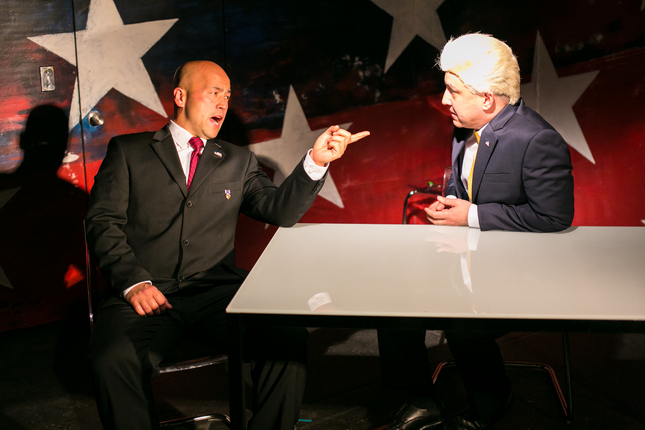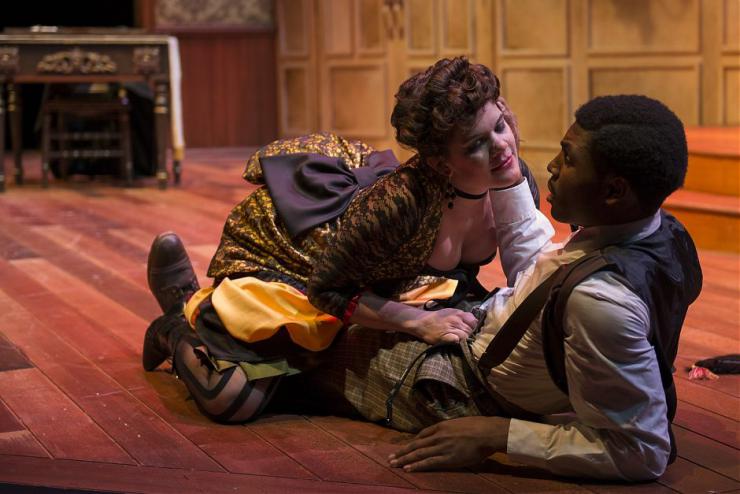available for purchase
at this time.
In The Intersection
#StaffChat: Obehi’s TCG Fox Fellowship
February 4, 2016#StaffChat posts feature issues, articles, and news that the C1 team discusses as part of our weekly all-staff meeting. We’d love to hear your thoughts too — hit us up on Facebook or Twitter!
♦♦♦♦♦
This post was written by Obehi Janice, who joined Company One’s staff as a resident actor last fall — we’ll be spending some time at our upcoming staff meeting chatting about what it means to be a resident actor at C1, and how Obehi can intersect with the various departments of the company through her work as a TCG Fox Foundation Fellow.
I first learned I was one of six actors nationwide to receive a Fox Foundation Fellowship through Theatre Communications Group in August 2015. In October 2015, I began attending weekly C1 staff meetings as part of the collective and contributing thoughts to the general decision-making model. In the midst of all this rapid change, and weeks prior to receiving the grant, I was cast in An Octoroon and We’re Gonna Die.
I would be lying if I didn’t say that my life has completely changed in a short amount of time. Never in my career did I think that I would have the opportunity to be a “resident actor”. C1’s belief in me as a growing actor, as well as their trust in me to be around the table week after week, signifies that even though we should all celebrate this unique opportunity, it is also a time for the collective to take a step back and ask, “What should this look like?”
Link Roundup! – 1/29/16
January 29, 2016Link Roundups feature articles and bits of internet goodness that our dramaturgy team digs up. If you find something you want to send our way, drop us a line on Facebook or Twitter!
♦♦♦♦♦

The 2011 edition of Boston’s annual Santa Speedo Run. (REUTERS/Brian Snyder)
Boston has plans to make the city more fun via the Late Night Task Force, as reported by The Atlantic’s CityLab:
Good times are good for good’s sake, but there’s a powerful economic argument behind the mayor’s push, too. An example: a report from the San Francisco Office of the Controller found that nightlife generated $4.2 billion in spending in 2010. Though most of the people who enjoy that city’s restaurants, bars, and music venues are local, more than half of that $4.2 billion comes from visitors’ wallets. A 2004 report commissioned by the New York Nightlife Association found that clubs and bars alone generate $9.7 billion annually for the city. The research data firm IBISWorld estimates that American bars and nightclubs took in $26 billion in 2015. Good times are also big business.
♦♦♦♦♦
American Theatre has a story about playwrights working for TV and film:
For the bulk of my life, “TV writer” has been a gentle euphemism for “failed playwright.” A serious theatre person would barely admit to having a television, much less watching one. Those days are long gone. Now if you tell people that you haven’t seen “Breaking Bad” or “Mad Men,” it’s a kind of moral failing, an indication of poor character. Not watching the right television has become the mark of the philistine. And TV has largely claimed the center of popular culture, supplanting even film. If you go out on the street right now and ask people what movie they think should win the Oscar, you’re likely to get shrugs and vacant stares. Ask them what happened to Jon Snow on “Game of Thrones” or what the ending of “Mad Men” meant, and you’ll get a discourse on Internet conspiracy theories, spoilers, and deceptive camera angles. Ask them what will win the Tony and—well, they’ll probably say Hamilton. It’s the only Broadway show everyone knows about.
Link Roundup! – 1/22/16
January 22, 2016Link Roundups feature articles and bits of internet goodness that our dramaturgy team digs up. If you find something you want to send our way, drop us a line on Facebook or Twitter!
♦♦♦♦♦
Mayor Walsh has unveiled a new plan to increase arts funding and support:
As outlined in Tuesday night’s State of the City address at Symphony Hall, the programs will provide direct grants to individual artists, expand the city’s fledgling artist-in-residence program, and establish an artist resource desk at City Hall, which officials said would act as a central information hub for artists working in the city.
♦♦♦♦♦
The Boston Globe has a report on the state of Boston arts funding compared to arts funding around the country:
Boston places near the top of 11 major cities across the United States in the number of nonprofit cultural organizations in the city and the revenue they earn. But the city’s wealth of arts organizations receive comparatively meager foundation and corporate support, are overburdened with facilities costs, and place dead last in per-capita government funding for the arts.
“The good news is that this confirms that we’re punching way above our weight in terms of the health, vitality, and size of the cultural sector in this city,” said Paul Grogan, president of the Boston Foundation. “The bad news is, compared to other cities, certain kinds of financial support that other cities have put in place are not in place here, and that’s a particularly difficult thing for the small- and medium-size organizations.”
Link Roundup! – 1/16/16
January 16, 2016Link Roundups feature articles and bits of internet goodness that our dramaturgy team digs up. If you find something you want to send our way, drop us a line on Facebook or Twitter!
♦♦♦♦♦
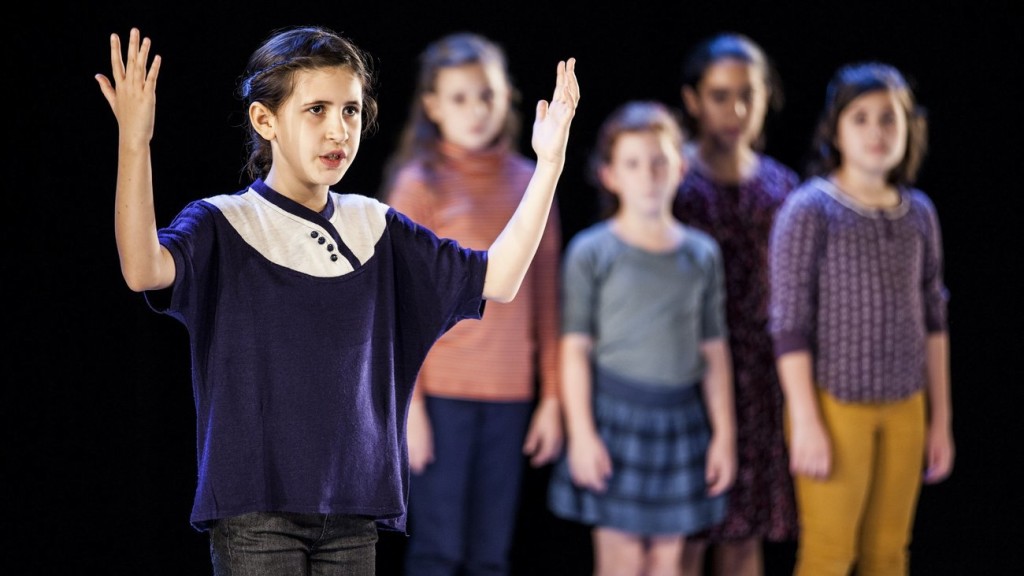
Violet Newman is one of five young girls who make up the cast of Employee of the Year, one of the plays being featured at this year’s Under the Radar Festival. Maria Baranova/Courtesy of the Public Theater
NPR has a story about the Under The Radar festival and how the co-artistic directors of the festival approach their programming:
Meiyin Wang and Mark Russell, co-artistic directors of Under the Radar, crisscross the globe every year trying to answer a single question. “In this day,” Russell says, “when there’s all sorts of great ways of telling stories and everyone’s got a camera … we’re looking at: Why do theater now?”
♦♦♦♦♦
The LA Times interviewed the creator of the #OscarsSoWhite hashtag after the Academy Award nominations were announced this past week:
Thursday morning, the Academy of Motion Picture Arts and Sciences announced the nominees for this year’s coveted golden statue. For the second year in a row, not one nominee in the four major acting categories is a person of color. Furthermore, people of color are virtually absent from all the other categories as well.
Link Roundup! – 1/8/16
January 8, 2016Link Roundups feature articles and bits of internet goodness that our dramaturgy team digs up. If you find something you want to send our way, drop us a line on Facebook or Twitter!
♦♦♦♦♦
American Theatre published a post in support of the playwrights that a few recent casting controversies centered around, and include over 1300 signatures from artists and students across the country who share their support:
Yes, this can be a complex and nuanced discussion. Yes, we enter into those discussions with different perspectives and familiarity with the issues. Yes, the missions of educational institutions are different from those of professional theatres. It is critical, however, that we don’t let those differences and complexities keep us from acknowledging the systemic racism that afflicts our country, nor our power as storytellers and community builders to end it.
♦♦♦♦♦
NPR highlights a recent article from The Atlantic about color-blind casting, arguing that color-conscious casting in film and television leads to a richer viewing experience:
We know that whiteness often masquerades as a kind of baseline experience without inflection or inclination in American life, and so we tend to buy the idea that progress for actors of color means a choice between roles in which their character’s race is either utterly unremarked upon (see early Grey’s Anatomy), or where race is the entire point (12 Years a Slave and other productions About RaceTM and hardship).
Of course, the backgrounds of the characters needn’t be foregrounded in every scene for it to be acknowledged. I’m thinking of Creed, the very good recent entry to the Rocky canon that doesn’t run away from the fact that the successor to the Italian Stallion is a black dude who navigates a distinctly black social setting. The same could also be said of Master of None, Aziz Ansari’s Netflix series about the life of a struggling actor in New York. The show is sometimes a straight-ahead romantic comedy, and other times it deals directly with the way being desi complicates and informs the professional and personal life of Aziz’s character. (It probably matters that both are the creations of people of color.)
♦♦♦♦♦
CHESHIRE ISAACS/IMPACT THEATRE GOP presidential candidate Len (played by Michael Uy Kelly) is interviewed by a cable news personality (Matthew Lai) in “Mutt,” a wild satire about race and politics playing at Berkeley’s Impact Theatre. ( it )
Impact Theatre, based in the Bay Area, has announced that they will be closing later this year:
“We’re stuck in a weird financial place because most grants require you to have an annual budget of $100,000 or more,” Hillman says. “And we can’t make enough in ticket sales to grow. All that money to grow comes from grants and donations, and when we’re doing new plays by emerging playwrights in a basement with pizza and beer, our audience always skews really young, and those people just don’t have a lot of money. That was the audience we wanted, that was the audience we went for, and that was part of the whole point of keeping ticket prices accessible.”
♦♦♦♦♦
The Nonprofit with Balls blog has some good reminders about how the term equity, while a great goal to strive for, can easily be watered down and turned into another meaningless buzzword:
At this early stage in the development of equity as a mainstream concept, the dissonance is understandable. We are all still trying to grasp what equity is and what it means for our field. But there are too many instances of dissonance out there that if we don’t stop to reflect, there is danger of “Equity” doing more harm than good, since it can lull us into a false sense of security. True equity requires us not to just throw around concepts at summits and sprinkle terminologies on websites and strategic plans, but to reevaluate our beliefs and practices and definitions and board and staff composition and leadership and hiring practice and funding allocation processes and who is at the table and who set the table in the first place, etc. It requires us to change our ways of doing things.
Link Roundup! – 12/18/15
December 18, 2015Link Roundups feature articles and bits of internet goodness that our dramaturgy team digs up. If you find something you want to send our way, drop us a line on Facebook or Twitter!
♦♦♦♦♦

Lester Hellman Shamos, Megan Cramer, Martin McWatters, Lena Hellman, and Lindsay Torrey at SPACE on Ryder Farm in Brewster, N.Y. (Photo by Talya Chalef)
American Theatre has a piece about companies that are including amenities for work/life balance, like on-site child care, into their operations:
Creating a supportive work enviornment can address both old dilemmas and new social realities. Jobs in the nonprofit theatre can be less lucrative than jobs in other sectors, observes Amanda White Thietje, managing director of Minneapolis’s Mixed Blood Theatre. At Mixed Blood, she says, “The salaries do not match the corporate headquarters nearby.” So it behooves the company to consider, as she puts it, “What are the ways we make sure [employees] feel rested and appreciated and have time with their families?” Such a strategy can have the added bonus of cutting down on employee turnover, which is expensive and disruptive for a company, she notes.
♦♦♦♦♦
The Boston Globe highlighted the recent NEA grant awards, including the one Company One received for a new Kris Diaz project:
The piece, using the rivalry between the Celtics legend and Wilt Chamberlain to highlight issues of race, class, and segregation in Boston, was commissioned by the Oregon Shakespeare Festival as one of a series of plays addressing US history.
Link Roundup! – 12/11/15
December 11, 2015Link Roundups feature articles and bits of internet goodness that our dramaturgy team digs up. If you find something you want to send our way, drop us a line on Facebook or Twitter!
♦♦♦♦♦
Playwright Dominque Morisseau’s recent essay for American Theatre addresses the loaded social politics of theatre etiquette and the inherent privilege present in many theatre spaces:
We take their donor money and put them on boards, and we brush their microaggressions off as our old grandma or grandpa who might be a little racist and elitist but are otherwise harmless.
To that I ask: harmless to whom? I am telling you it is not harmless. It is harmful. It further marginalizes audiences of color and tells them they are not fully welcome in the theatre, except by permission of the white audience. It tells the upper-middle-class white audience that theatre is their home first and the rest of us are just guests.
♦♦♦♦♦
The Atlantic has a story about a graduate art project at the State University of New York at Buffalo that brought up issues of safe spaces and artistic intent:
Activists who say the display crossed a line insist that they are not focused on the artist or her intentions, but are concerned instead with the impact of the project on students and the administration response. Nevertheless, the controversy highlights the fact that many students view free speech as a critical part of, and not a diversion from, conversations over race on campus. Yet even so, students don’t necessarily agree on what constitutes a threat to free speech.
Link Roundup! – 12/4/15
December 4, 2015Link Roundups feature articles and bits of internet goodness that our dramaturgy team digs up. If you find something you want to send our way, drop us a line on Facebook or Twitter!
♦♦♦♦♦
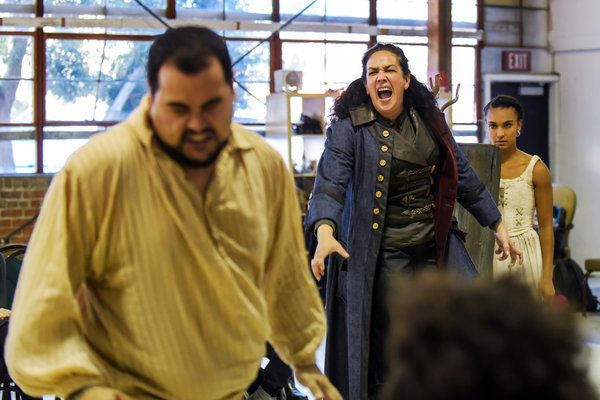
From left, John R. Lewis, Catherine Castellanos and Tristan Cunningham during a rehearsal of California Shakespeare Theater’s production of “The Tempest.” Credit Alessandra Mello
The New York Times ran a feature on Ten Thousand Things and their radical approach to programming theatre for people on the margins of society:
“When you say you do theater for people in prisons and homeless shelters,” Ms. Hensley conceded, “people’s first reaction is: ‘That must be really awful theater. It must be skits about staying off drugs.’” It took a while, she said, to convince mainstream audiences, critics and funders that the experiences of those nontraditional audiences “mirror the extremes of the characters in the way that most upper-class audiences just don’t.”
Born in Iowa and educated at Princeton and U.C.L.A., Ms. Hensley, 57, quickly grew disillusioned with the idea of climbing the regional theater ladder. Living in Los Angeles in the 1980s, she observed the chasm between haves and have-nots and concluded that there was an audience hungry for high-quality theater that respected their humanity.
♦♦♦♦♦
The Art Works blog has a post about the National Academies of Sciences, Engineering, and Medicine’s exploration of how integrating the arts can benefit STEM fields:
Many examples exist (some were shared at the workshop) of scientific and technological endeavors that have benefited from artistic practice or pedagogy. “Design thinking” leaps to mind, but so do arts integration with medical training, or artists who help scientists visualize their data, especially to communicate a public health message. Indeed, scientists at the workshop—and at similar events I’ve attended in the past year—readily acknowledge that the infusion of the arts and humanities could awaken in scientists and engineers a capacity for emotional connections, creativity, and complex problem-solving that might lie dormant without such exposure.
My question: if we strive for full integration, then what new “habits of mind” (as one workshop participant called it today) should be cultivated by STEM-related training for arts/humanities students? Or is the relationship not in fact bi-directional?
Link Roundup! – 11/20/15
November 20, 2015Link Roundups feature articles and bits of internet goodness that our dramaturgy team digs up. If you find something you want to send our way, drop us a line on Facebook or Twitter!
♦♦♦♦♦
In HowlRound, Lavina Jadhwani examines what it means to be a color conscious director:
Since I first wrote about color-conscious casting, I’ve learned—by directing my own productions as well as casting plays that I did not direct—that color-conscious casting doesn’t guarantee a color-conscious production. Diverse casting is a cause; a more challenging and/or inclusive conversation is not inherently an effect.
♦♦♦♦♦
Boston Magazine continues the coverage of Boston’s arts space issues, with a particularly pointed look at Mayor Walsh’s participation in finding solutions:
Compare Walsh’s response with what happened in 2003, when the city faced another crisis in the Theater District. Back then, the Wang Center for the Performing Arts—now the Citi Performing Arts Center, the same one Citi is pulling out of—summarily booted the Boston Ballet’s beloved production of The Nutcracker to make room for a carpetbagging production of New York’s Rockettes in the Radio City Christmas Spectacular. The next morning, Mayor Thomas Menino was on the phone trying to secure the Hynes Convention Center as a new home for the ballet. (Thankfully, that never happened—right sentiment, absolutely wrong venue.) Menino worked behind the scenes for months to seal a deal for the ballet, which leased the newly restored Boston Opera House at affordable rates and eventually took its toe shoes and tutus there for its entire season.
Link Roundup! – 11/13/15
November 13, 2015Link Roundups feature articles and bits of internet goodness that our dramaturgy team digs up. If you find something you want to send our way, drop us a line on Facebook or Twitter!
♦♦♦♦♦
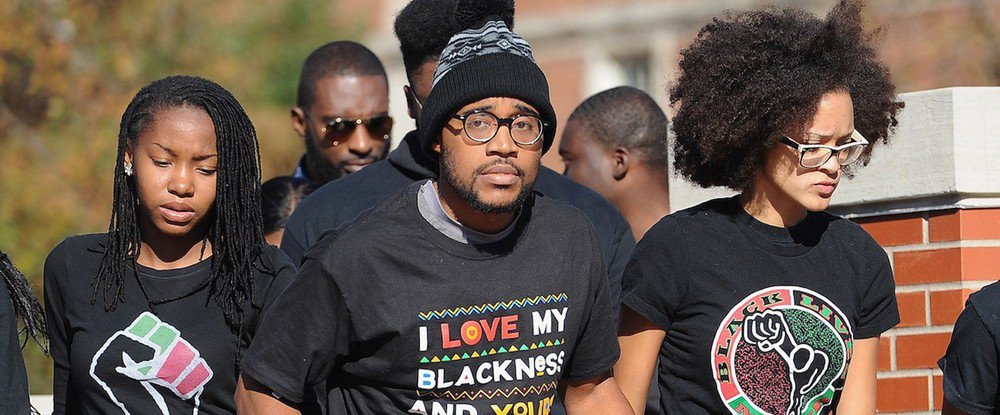 Roxane Gay’s post in The New Republic does a good job detailing the recent student activism at Mizzou and Yale, as well as detailing the larger cultural forces behind the protests:
Roxane Gay’s post in The New Republic does a good job detailing the recent student activism at Mizzou and Yale, as well as detailing the larger cultural forces behind the protests:
There is often condescension in examinations of these supposedly fragile young people who don’t understand the real world. College students do, however, understand the real world, because they aren’t just students: They do not abandon their class background or sexuality or race or ethnicity when they matriculate, and their issues do not vanish when they register for courses. We should not dismiss their valid concerns. To do so, to invalidate their experiences, would be to invalidate their diversity and ignore their hurt. American colleges and universities have always been incubators for the privileged, and the only people who continue to operate there with some guarantee of physical and emotional safety are white, heterosexual men. Is it any wonder, then, that students are demanding a basic guarantee of safety?
♦♦♦♦♦
WGBH Open Studio will be airing an episode tonight specifically about the recent changes in the Boston theatre landscape related to lack of space and resources. You can check out a preview HERE, and tune in at 8:30pm to catch the rest.
